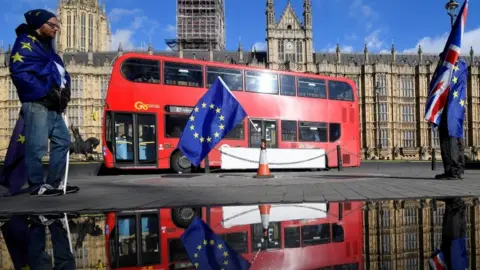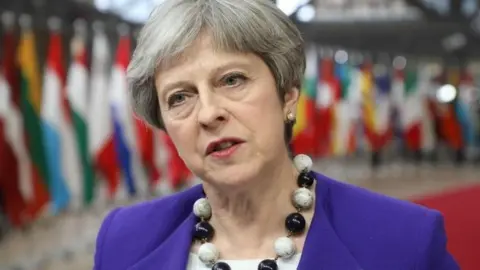Brexit: The EU perspective on the one-year countdown

 Reuters
ReutersAs the UK marks one year until Brexit, Brussels negotiators are indulging in a bit of muttering under their breath .
They consider the 12-months-to-go focus misleading for two main reasons:
- The time left to negotiate a Brexit deal is far less than a year according to the European Commission. EU lead negotiator Michel Barnier says talks must wrap up by late autumn this year to allow the European and British parliaments time to vote on any agreement.
- While the UK officially - and legally - does leave the EU next March, it is then expected to enter a so-called transition or implementation period where it remains tethered to the EU, maintaining most aspects of membership, including paying into the EU budget. That phase ends in December 2020 and it is then that Brussels feels the UK really, truly walks out the door.
As for a new EU-UK trade deal and other aspects of the future relationship, estimates as to how long that will all take to finalise vary from months to years.
Why can't it be all done and dusted by Brexit day on 29 March 2019?
Well, under EU law, Brussels can't finalise a new relationship with the UK until it is legally an "outsider" having formally left the club.
So, if all goes according to the EU-UK plan, by March next year they will have a completed withdrawal agreement under their belt, covering the transition period and the so-called divorce issues (the financial settlement to be paid by the UK; rights for EU citizens living in the UK and UK citizens in the EU after Brexit; and a concrete plan to avoid the re-introduction of a hard border between Northern Ireland and the Irish Republic).
This agreement will be a legal text, most of which has already been signed off by both sides.
The key sticking points that remain (and they're not small ones) are the Irish border and governance of the agreement - i.e. the role of the European Court of Justice.

More on Brexit: One year to go

The EU and the UK say they are committed to resolving outstanding problems.
Both sides really want a deal. Political, as well as economic and security, stakes are high.
In addition to the withdrawal agreement, the EU and UK are also working on what's being called a "political declaration" to outline the direction of their future relationship. As a declaration, rather than legal text, EU law does allow this to be negotiated ahead of Brexit day.
Just how much detail goes into the declaration is being debated at the moment between EU member countries.
 AFP
AFPFor Theresa May, performing a delicate balancing act to try and keep her Brexit-divided cabinet and country together, the less detail the better.
It is at this stage of negotiations (as I've mentioned in this blog before) that EU unity will begin to fray as the national interests of different member states come to the fore.
Expect disagreements, though not deep rifts - and watch the EU do its best to keep any infighting behind closed doors as Denmark prioritises fishing rights, Luxembourg focuses on financial services, Spain, Slovakia and Czech Republic push for the freedom of their citizens to come and work in the UK while Poland advocates a close EU-UK security relationship post-Brexit to help bolster the country against its volatile neighbour, Russia.
Speaking to the Polish prime minister recently about Brexit, I was struck by how often he used the word "compromise" - not often heard in Brussels when it comes to negotiations.
A stark contrast to a conversation I had with France's economy minister when I sat down with him.
He said he wanted a fair Brexit but also insisted the EU had no intention of bending its rules to accommodate the UK.
"We have to protect ourselves," he told me.
Big EU powers France and Germany are convinced that they gain more by protecting the EU and its single market for members than they risk losing in establishing weaker trade relations with the UK after Brexit.
Heading into this one-year-to go countdown until Brexit, EU countries are feeling confident.
The mood music with UK negotiators has very much improved and besides, the EU believes it holds the best cards.
